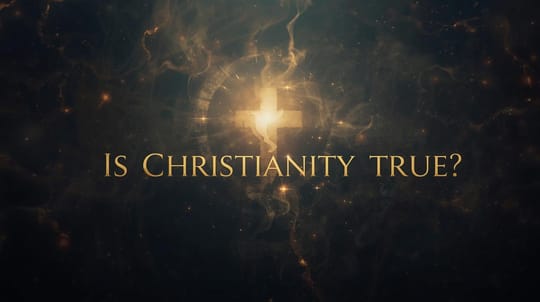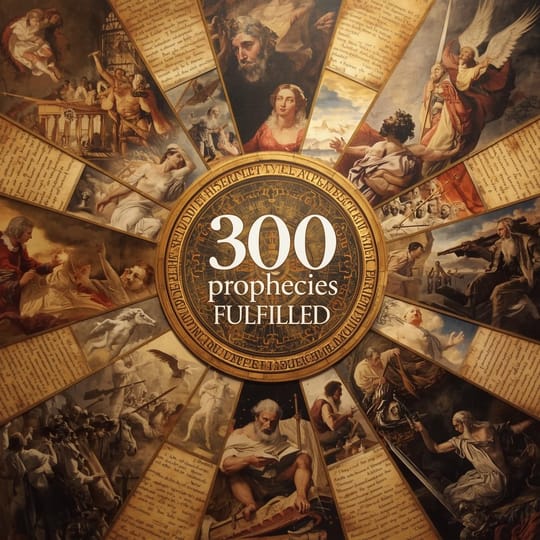Question: Okay, I get that the Bible was carefully preserved over the years. I believe we have now what they wrote then. But, how can I know what they wrote was true?
Answer: What a great question! In the Western world, our confidence in anything that claims to be true has been shaken. It is a great idea to think deeply about this when it comes to the Bible. The Bible is ready to defend itself and give us confidence.
Let’s talk about it.
When people question the Bible, they usually focus on manuscripts, translations, or copying accuracy. But there’s a deeper question under the surface:
Question: Is what the Bible actually says true?
Answer: Not just preserved… It’s true.
Here’s some proof…
1. The Bible Is Anchored in Verifiable History
The Bible names real places, rulers, and events that can be tested against external records. These aren’t legendary “once-upon-a-time” stories. They are rooted in verifiable history.
For example, Scripture identifies:
- Assyrian kings (Tiglath-Pileser, Sennacherib)
- Babylonian rulers (Nebuchadnezzar, Belshazzar)
- Persian kings (Cyrus, Darius)
- Roman officials (Pontius Pilate, Herod, Caesar Augustus)
Non-biblical writings, inscriptions, coins, and archaeological findings confirm their existence. Time after time, the Bible proves to be an accurate historical record, not mythology.
The Bible was written by real people who lived in real time. Every time you see a name, place, event, etc… the Bible is firmly setting itself in the narrative of history.
2. The Bible Contains Undesigned Coincidences
Across 66 books, written by 40+ authors over roughly 1,500 years, there are countless small details that fit together perfectly without evidence of deliberate planning.
One book will mention a passing detail that answers a question raised in another book written centuries earlier. These subtle connections — called undesigned coincidences — point to authentic, independent eyewitness accounts rather than edited legend.
It looks less like a human conspiracy and more like consistent truth recorded by different authors.
This internal harmony supports content reliability. There is this weird idea that all the authors lived at the same time and passed notes between each other. This couldn’t be further from the truth. When you realize how different these people were, where they lived, when they lived, etc… you realize how amazing this is.
3. The Bible Includes Embarrassing and Damaging Information
People making up a story never make themselves look bad.
Yet the Bible openly reports:
- The failure of Israel, God’s chosen nation
- The cowardice and confusion of the disciples
- The moral collapse of kings and prophets
- The denial of Peter
- Doubt within Jesus’ own family
No propaganda would include details like these unless they were true. These uncomfortable admissions prove the writers were not protecting an image — they were reporting reality.
Honesty is a sign of truth. This is used many times by historians to figure out truth in other works of literature. You can apply the same to the Bible.
4. The Fulfilled Prophecies Are Specific and Precise
The Bible contains hundreds of prophecies written long before the events ever occurred.
Just a few examples:
- The fall of Babylon was predicted (Isaiah 13) before it happened
- The rise of the Persian Empire was predicted by name (Isaiah 44–45 mentions Cyrus before his birth)
- The destruction of Jerusalem was foretold (Daniel, Micah, Jesus Himself)
- The crucifixion was described in Psalm 22 and Isaiah 53 long before Romans invented that method
These are not vague predictions. They are detailed, geographically and historically accurate. This level of predictive precision cannot be explained by chance.
5. The Resurrection of Jesus Is the Best Historical Explanation
The foundation of the Bible’s truth rests on one central claim: Jesus rose from the dead.
The historical facts accepted by even many non-Christian scholars are:
- Jesus was publicly crucified
- His tomb was found empty
- His disciples sincerely believed they saw Him alive
- His skeptics (like James and Paul) converted after claiming to encounter Him
- The church exploded in growth immediately after His death
If the resurrection did not happen, Christianity never should have survived. The resurrection best explains the origin and unstoppable growth of the Christian faith.
One of the facts that got me was that Jesus’ brother James became a leader in the Church and affirmed Jesus as God. James did not follow Jesus before the Resurrection. However, James claimed to have seen Jesus and followed afterward. Think about it. What would it take for you to believe that your brother was God? The only thing, for me, would be seeing Him rise from the dead. “Okay, bro. I believe you.”
6. The Bible Has Been Preserved Under Unmatched Scrutiny
For centuries, emperors, governments, and critics attempted to destroy Scripture. Yet it remains the most translated and distributed book in human history.
No ancient text has been examined, criticized, attacked, and tested as much as the Bible — yet it still stands. If the content were false, it would have collapsed under the weight of its scrutiny long ago.
Truth survives inspection.
7. The Bible Uniquely Explains Human Nature and Reality
The Bible describes exactly what we see in the world:
- Human dignity and human depravity
- The desire for justice
- The reality of guilt
- The ache for meaning
- The brokenness of the world
- The longing for redemption
It diagnoses the problem (sin) and offers the solution (redemption through Christ). No other worldview more accurately explains both the evil we witness and the hope we crave.
Truth always aligns with reality.
8. The Bible Has Transformed Billions of Lives Across Cultures
No other book has changed more lives than the Bible.
Across every continent and culture, it has:
- Delivered people from addiction
- Healed broken families
- Created hospitals and schools
- Inspired civil rights movements
- Strengthened the oppressed
- Produced radical forgiveness
False teaching cannot consistently produce good fruit for 2,000+ years. Jesus said, “By their fruit you will recognize them.” The fruit of God’s Word is undeniable.
Bottom Line: This Is Not Blind Faith. Christianity is making logical sense of reality.
To trust the Bible is not to abandon reason. It is to follow the evidence where it leads.
You can trust the Bible’s content because it is:
- Historically grounded
- Internally consistent
- Prophetically accurate
- Verified by the resurrection
- Proven through transformation
- Confirmed by reality
The Bible does not hide from testing. It invites it.
“Sanctify them in the truth; Your word is truth.” — John 17:17









